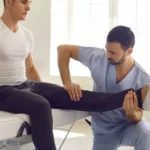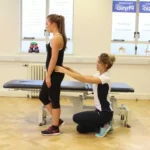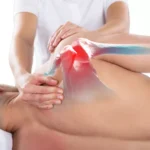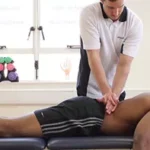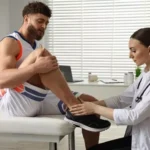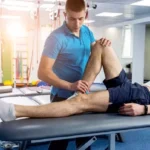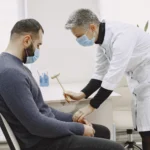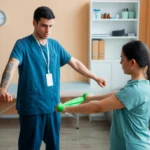Spine Physiotherapy Specialist In Thane
Overview
Back pain changes how we move and how we feel about everyday tasks. At AcktivOrtho we see people whose lives are limited by stiffness, pain, or fear of re-injury, and we approach each case as a mission to restore movement and confidence. I am Dr. Saikat Jena and, together with our team, we combine surgical experience and specialist rehabilitation to deliver outcomes that last. In this article we explain how we assess spine problems, outline evidence based physiotherapy, and describe how our integrated care shortens recovery and reduces recurrence.
Why focused spine physiotherapy matters
Spine problems are rarely solved by generic exercises or one-off treatments. We aim to identify the true drivers of pain, whether they arise from joints, discs, nerves, or muscle imbalance, and then build a customised plan. Our rehabilitation focuses on motor control, graded loading, manual therapy, and practical education so gains carry over into daily life. When physiotherapy and orthopedic decision making are aligned, unnecessary procedures are avoided and recoveries become more predictable. We measure progress and adapt the plan until functional goals are met.
Common spine problems we treat
In Thane we manage a broad spectrum of spine conditions including low back pain, neck pain, sciatica, degenerative changes, post-operative stiffness, and sports-related injuries. Many patients present with overlapping issues such as mechanical pain plus neural irritation or movement dysfunction. Chronic patterns often reflect inadequate progressive loading rather than irreparable damage. We tailor our interventions to the principal problem identified during assessment and design stepwise plans that address pain, control, strength, and function.
When to seek specialist spine physiotherapy
Persistent pain beyond a few weeks of simple care, recurrent flare ups, limitations in walking or sitting, and neurological symptoms call for specialist input. We recommend early assessment when functional tasks are affected or prior treatments have given only temporary relief. Post-operative cases and recurrent radiculopathy benefit from an integrated clinic where surgical and physiotherapy plans are coordinated. Red flag signs require urgent medical attention and we expedite imaging or surgical consultation when needed. Early specialist care often shortens recovery and restores confidence.
What happens at the initial appointment
Our first visit begins with a focused history that captures symptom onset, aggravating and easing factors, and the tasks that matter most. We perform a structured physical examination including movement screening, neurological testing, and functional task observation. When available we review imaging to place structural findings in clinical context. We conclude with measurable short and medium term goals and an initial treatment plan combining hands on therapy, coaching, and exercises. Clarity about the why and how of the program is central to our process.
How we decide if imaging is needed
Imaging is valuable but not always the starting point for mechanical spine pain. We order or review MRI, CT, or X ray when red flags exist, when neurological compromise is suspected, or when surgical planning is required. Often the clinical picture guides treatment more than imaging because many structural findings are incidental. When imaging is used it helps us target rehabilitation or confirm operative indications. Our approach is to use imaging judiciously so it informs care rather than prompting unnecessary interventions.
Managing radicular pain and sciatica
Radicular pain often causes radiating symptoms and functional limitation, and our strategy is to reduce neural sensitivity while correcting mechanical drivers. We use positional strategies, targeted neural glides, and a graded loading plan to restore nerve tolerance and movement. Ergonomic adjustments and symptom modifying positions reduce ongoing compression during daily tasks. When neurological deficit progresses or is severe we coordinate urgent surgical review to prevent permanent loss. Many cases settle with a well sequenced rehabilitation program and careful monitoring.
Post-operative spine rehabilitation principles
After spine surgery our focus is early protected mobility to prevent stiffness and staged reloading to rebuild capacity. We divide rehab into phases with clear functional milestones: pain and wound management, gentle activation, progressive strengthening, and return to work or sport. Regular surgeon-physiotherapist communication ensures precautions are honoured and progression is safe. Scar and soft tissue care, balance retraining, and task specific conditioning are essential for durable recovery. An integrated pathway reduces complications and shortens time to meaningful function.
When physiotherapy may not be enough
Conservative care is effective for many conditions but there are cases where structural compromise or progressive neurological loss requires surgery. When function does not recover despite appropriate rehabilitation we discuss operative options and expected outcomes. We use shared decision making to balance risks and benefits and to avoid delays that might worsen the prognosis. Our role is to recommend timely referral when indicated so recovery potential remains high. Combining the right operation with staged rehab often yields the best long term results.
Choosing the right spine physiotherapy partner in Thane
When selecting a specialist we value postgraduate training in spinal rehabilitation, experience with post operative protocols, and close collaboration with orthopedic surgeons. Access to supervised gym facilities, progressive loading equipment, and systematic outcome tracking raises the standard of care. Clear communication, realistic timelines, and transparent expectations foster adherence and trust. At AcktivOrtho we combine surgical expertise with dedicated physiotherapy resources to provide an integrated, measurable pathway to recovery.
Typical timelines for common spine conditions
Acute mechanical low back pain often shows meaningful improvement within four to six weeks, with fuller functional recovery over three months depending on demands. Radicular symptoms may take weeks to several months for neurological recovery, depending on nerve involvement. Post operative pathways usually span three to six months for staged return to higher activity, with early milestones achieved in the first six weeks. Chronic recurrent patterns respond over months and benefit from ongoing maintenance. We set timelines early so goals remain realistic and progress is visible.
How we coordinate care at AcktivOrtho
Our clinic follows integrated pathways that connect surgical assessment, imaging review, and specialist physiotherapy so decisions remain timely and informed. We hold regular case discussions between surgeons and therapists to align progression, respect precautions, and address setbacks quickly. Shared documentation and transparent communication about goals and timelines improve adherence and reduce uncertainty. When surgery is necessary the rehab plan begins preoperatively so postoperative milestones are already familiar. This model shortens recovery and builds confidence in the care pathway.
How to book an appointment with us
We accept consultations at AcktivOrtho and coordinate evaluations that combine orthopedic review with specialist physiotherapy when indicated. Appointments can be scheduled via our website or by telephone and we provide clear guidance about what to bring to the first visit. Early assessment helps identify the most efficient path to recovery and reduces the risk of prolonged disability. For appointments please visit acktivortho.com or call +91-99670 63812.
Further reading for clinicians and therapists
We regularly consult comprehensive, peer reviewed collections to keep our spine rehabilitation protocols current and evidence based. When we need deep research syntheses on exercise paradigms, manual therapy strategies, and outcome measures, we refer to the SpringerLink collection on physiotherapy for spine disorders, which aggregates systematic reviews and clinical trials SpringerLink collection on physiotherapy for spine disorders. Reviewing these papers helps us refine decision pathways for conservative care versus surgical referral and compare outcome metrics across studies. The collection informs how we adapt high‑level evidence to the realities of outpatient care in Thane. We encourage clinicians on our team to read selected reviews from this source when updating protocols or designing audits.
Practical open-access reference for day-to-day practice
We also depend on clear, open educational resources that translate evidence into usable clinical tools for busy clinics. For concise clinical summaries, step by step exercise progressions, and patient education materials we use the Physiopedia rehabilitation knowledge hub, which offers practical modules and downloadable guides suitable for outpatient use Physiopedia rehabilitation knowledge hub. These resources help us standardise coaching cues, progression criteria, and patient handouts so that exercises prescribed in clinic are reproducible at home. When training junior therapists or preparing a home program, we cross check our protocols against Physiopedia entries to ensure clarity and safety.
FAQs About Spine Physiotherapy
Q.1: What conditions do we treat?
Ans. We treat low back pain, neck pain, sciatica, degenerative changes, post‑op rehab, and sports or trauma related spine issues.
Q.2: How quickly do people improve?
Ans. Many notice relief in 2–6 weeks; meaningful functional gains often take around 3 months.
Q.3: Is imaging always needed?
Ans. No; we use MRI/CT/X ray when red flags, neurological signs, or surgical planning are present.
Q.4: Can physiotherapy avoid surgery?
Ans. Often yes for many conditions, but some structural or progressive neurological problems still need surgery.
Conclusion
Spine problems respond best to careful assessment, progressive rehabilitation, and timely surgical input when required. At AcktivOrtho we combine surgical experience with specialist physiotherapy to create clear, measurable plans that restore function and reduce recurrence. We focus on practical exercises, ergonomic changes, and coordinated care so movement becomes reliable again. If a structured, evidence based pathway is needed, our team is ready to plan and support each step of recovery.
Spine Physiotherapy Specialist In Thane Spine Physiotherapy Specialist In Thane Spine Physiotherapy Specialist In Thane Spine Physiotherapy Specialist In Thane Spine Physiotherapy Specialist In Thane Spine Physiotherapy Specialist In Thane Spine Physiotherapy Specialist In Thane Spine Physiotherapy Specialist In Thane Spine Physiotherapy Specialist In Thane Spine Physiotherapy Specialist In Thane Spine Physiotherapy Specialist In Thane Spine Physiotherapy Specialist In Thane Spine Physiotherapy Specialist In Thane Spine Physiotherapy Specialist In Thane Spine Physiotherapy Specialist In Thane Spine Physiotherapy Specialist In Thane Spine Physiotherapy Specialist In Thane Spine Physiotherapy Specialist In Thane Spine Physiotherapy Specialist In Thane Spine Physiotherapy Specialist In Thane Spine Physiotherapy Specialist In Thane Spine Physiotherapy Specialist In Thane




